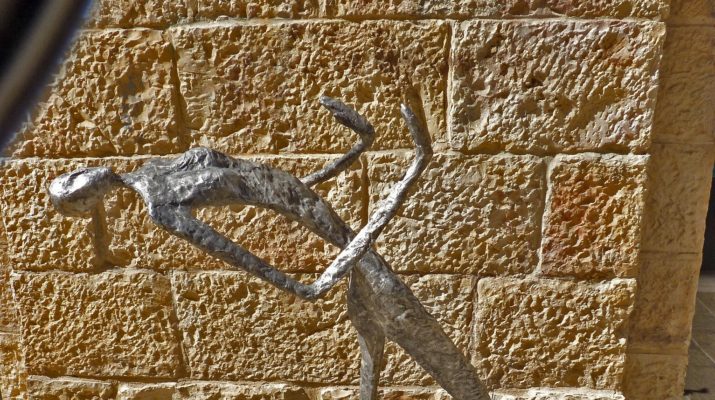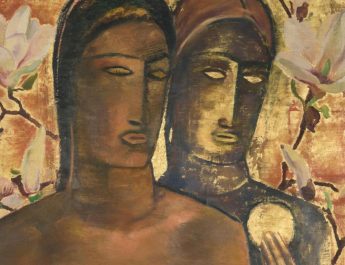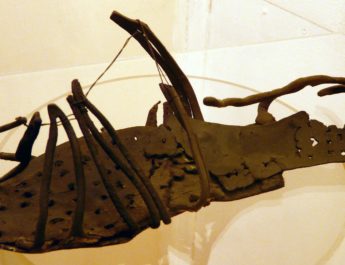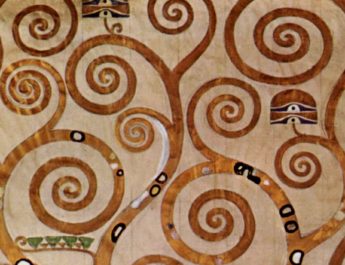Judges 11:29-40
Good Friday – A Women’s Lectionary
29 Then the spiritA of the LordB cameC upon Jephthah,D
A “spirit” = ruach. This is breath, wind, air, cool, spirit. This is wind, which resembles the breath and so this can be used figuratively for life itself or being frail/mortal/impermanent. It can refer to the air of the sky or the spirit.
B “Lord” = YHVH. Related to “came” in v29. From havah (see note C below) or hayah (to come to pass, become, be). This is the name of the God of Israel, the self-existent and eternal one, the tetragrammaton. This pronunciation has been lost to time so “Lord” is generally used in its place.
C “came” = hayah. This is to be or become, to happen.
D “Jephthah” = Yiphtach. From pathach (to open wide in a literal or figurative sense; to open, draw out, let something go free, break forth, to plow, engrave, or carve). This is Jephthah or Iphthah, meaning “he opens.” It is a name and a city.
and he passed throughE GileadF and Manasseh.G He passed on to MizpahH of Gilead, and from Mizpah of Gilead he passed on to the Ammonites.I
E “passed through” = abar. This is to pass over or cross over. It is used for transitions, whether literal or figurative. It can also mean to escape, alienate, or fail. This is the root verb from which “Hebrew” is drawn.
F “Gilead” = Gilad. From gala (to lay bare, quarrel, expose) OR from gal’ed (heap of testimony); {from gal (wave, billow, rock pile; something rolled; a spring of water); {from galal (to roll, roll away, wallow, commit, remove; rolling in a literal or figurative sense)} + ed (witness, testimony, recorder); from ud (to admonish, repeat, duplicate, testify, restore, record, relieve)}}. This is Gilead, meaning “perpetual fountain” or “heap of testimony.” See https://www.abarim-publications.com/Meaning/Gilead.html#.Xw_EFShKhPY.
G “Manasseh” = Menashsheh. From nashah (to forget, neglect, remove, deprive). This is Manasseh, literally “causing to forget.” It is Manasseh, his tribe, or the lands of the tribe.
H “Mizpah” = Mitspeh. 10x in OT. From mitspeh (watchtower – particularly one for military use); from tsaphah (to look out, look around, spy watchman, sentinel; leaning out to look far away; to await or observe). This is Mizpah or Mizpeh, a place meaning “watchtower.”
I “Ammonites” = ben + Ammon. Literally, “children of Ammon.” Ben is from banah (to build or obtain children). This is son, age, child. It is son in a literal or figurative sense. Ammon is from am (people or nation; a tribe, troops or armies, or figuratively to refer to a flock of animals); {from amam (to darken, hide, associate; creating shadows by huddling together). This is Ammon or Ammonite, a people group whose name means “tribal” or “a people.”
30 And Jephthah madeJ a vowK to the Lord, and said, “If you will giveL the Ammonites into my hand,M
J “made” = nadar. This is to vow or promise.
K “vow” = neder. Related to “made” in v30. From nadar (see note J above). This is a vow – literally, that which was promised.
L “give” = natan + natan. This is to give, put, set, offer. It is to give literally or figuratively. The word is repeated twice – the first time as an Infinitive Absolute. The Infinitive Absolute serves to emphasize the sentiment of the word. It is rather like Foghorn Leghorn’s speech pattern, “I said, I said.”
M “hand” = yad. This is hand, ability, power. Hand in a literal sense, but also what one can do or the means by which one does it.
31 thenN whoever comes outO of the doorsP of my houseQ to meetR me,
N {untranslated} = hayah. Same as “came” in v29. See note C above.
O “comes out” = yatsa. This is to go or come out, bring forth, appear. It is to go out in a literal or figurative sense.
P “doors” = delet. From dalah (to draw, lift up; properly, to dangle; draw water; figuratively, to deliver). This is something that swings like a door, gate, leaf, lid, or other opening.
Q “house” = bayit. Related to “Ammonites” in v29. Probably from banah (see note I above). This is house, court, family, palace, temple.
R “meet” = qirah. From the same as qara (to happen, meet, bring about). This is any kind of encounter, whether peaceful, hostile, or incidental. It can also mean help or seek.
when I returnS victoriousT from the Ammonites, shall beU the Lord’s, to be offered upV by me as a burnt offering.”W
S “return” = shub. To turn back, return, turn away – literally or figuratively. Doesn’t necessarily imply going back to where you started from. This is also the root verb for the Hebrew word for repentance “teshubah.”
T “victorious” = shalom. From shalam (to be complete or sound; to have safety mentally, physically, or extending to one’s estate; so, if these things are safe and complete, the implication is that one would be friendly; and, if being friendly, one would make amends and that friendship would be reciprocated). This is completeness, soundness, welfare, favor, friend, good health. It is to be safe and figuratively well, happy, at peace, friendly. Abstractly, it includes the ideas of welfare and prosperity (not in excessive wealth, but in having enough).
U “be” = hayah. Same as “came” in v29. See note C above.
V “offered up” = alah. This is to go up, approach, ascend, be high, be a priority; to arise in a literal or figurative sense.
W “burnt offering” = olah. Related to “offered up” in v31. From alah (see note V above). This is a step, stairs, or some kind of ascent. It is also used for whole burnt offerings, being the offering in which the whole things is burned and rises as smoke. Burnt offerings were the least common of the offerings: most were eaten, shared with the priest and the one bringing the offering.
32 So Jephthah crossed overX to the Ammonites to fightY against them; and the Lord gave them into his hand. 33 He inflictedZ a massiveAA defeatBB on them
X “crossed over” = abar. Same as “passed through” in v29. See note E above.
Y “fight” = lacham. This is to eat or feed on. Figuratively, it is to battle as a kind of consumption/destruction.
Z “inflicted” = nakah. This is to hit whether lightly or severely. It can be used in a literal or figurative sense. So, this could be beat, punish, give wounds, kill, or slaughter.
AA “massive” = gadol + meod. Gadol is from gadal (to grow up, become great, become wealthy – to advance. The root meaning may be to twist in the sense of the process of growing). This is great, high, bigger, noble, old, marvelous. It can also refer to someone who is powerful or distinguished. Meod is perhaps from the same as uwd (firebrand, a poker). This is very, greatly, exceedingly. It can also mean vehemence, force, abundance.
BB “defeat” = makkah. Related to “inflicted” in v33. From nakah (see note Z above).
from AroerCC to the neighborhoodDD of Minnith,EE
CC “Aroer” = Aroer. 16x in OT. From the same as aroer (shrub or tree; may be a juniper); from arar (to strip, make bare, destroy). This is Aroer, a city whose name means “accumulation” or “stripped” or “heath.” See https://www.abarim-publications.com/Meaning/Aroer.html
DD “neighborhood” = bo. This is to enter, come in, advance, fulfill, bring offerings, enter to worship, attack. It can also have a sexual connotation.
EE “Minnith” = Minnith. 2x in OT. Form the same as from menath (portion or prey; any kind of allotment, whether personal, legal, or of fate); {from manah (to weigh out, reckon, count, number, set, tell; by implication, it is allotting or providing something officially)} OR from men (an instrument, particularly one with strings like a harp). This is Minnith, a place whose name means “enumeration” or “distribution” or “apportioned.” See https://www.abarim-publications.com/Meaning/Minnith.html
twentyFF towns,GG and as far as Abel-keramim.HH
FF “twenty” = esrim. From the same as eser (ten). This is twenty or twentieth.
GG “towns” = ir. From uwr (to awaken or wake oneself up). This can mean excitement in the sense of wakefulness or city. Properly, this is a place that is guarded. Guards kept schedules according to watches. This sense of the word would include cities as well as encampments or posts that were guarded.
HH “Abel-keramim” = abel + kerem. Abel is 1x in OT. Its root may mean grassy. This is Abel, meaning “meadow” or “plain.” It could also mean stream or brook. Kerem is a vineyard, garden, vines, or a vintage. It may mean “stream of the vineyards” or “meadow of the vineyards.”
So the Ammonites were subduedII beforeJJ the peopleKK of Israel.LL
II “subdued” = kana. This is to be humble, subdue, humiliate, conquer. Properly, it means to bend the knee.
JJ “before” = paneh. From panah (to turn, face, appear). This is face in a literal or figurative sense. It could be face, presence, anger, respect. It can also be used of God to indicate divine favor or presence.
KK “people” = ben. Same as “Ammonites” in v29. See note I above.
LL “Israel” = Yisrael. From sarah (to persist, exert oneself, contend, persevere, wrestle, prevail) + el (God or god). This is Israel, meaning God strives or one who strives with God; new name for Jacob and for his offspring. This refers to the people and to the land.
34 Then Jephthah cameMM to his homeNN at Mizpah;OO and therePP was his daughterQQ coming out to meet him
MM “came” = bo. Same as “neighborhood” in v33. See note DD above.
NN “home” = bayit. Same as “house” in v31. See note Q above.
OO “Mizpah” = Mitspah. Related to “Mizpah” in v29. From tsaphah (see note H above). This is Mizpah, meaning “watchtower.”
PP “there” = hinneh. From hen (lo! Behold! If, though; an expression of surprise). This is to draw attention, show suddenness or surprise, or to emphasize the importance of the coming statement. See! Lo! Behold!
QQ “daughter” = bat. Related to “Ammonites” in v29 & “house” in v31. From ben (see note I above). This is daughter in a literal or figurative sense.
with timbrelsRR and with dancing.SS She was his onlyTT child;UU he had no sonVV or daughter except her.
RR “timbrels” = toph. 17x in OT. Perhaps from taphaph (to play a drum, timbrel, or tambourine). This is a timbrel or tambourine.
SS “dancing” = mecholah. 8x in OT. From machol (round dance); from chul (whirling around so dancing as in a circle or writhing in pain; used particularly for the pain of childbirth or from writhing due to fear; can also be falling in pain or waiting). This is a dance.
TT “only” = raq. From the same as raq (thin, surely, only); perhaps from raqaq (to spit). This is but, except, at least. In the sense of being thin, it figuratively refers to some kind of limit.
UU “child” = yachid. 12x in OT. From yachad (to join, be united). This is united, sole, solitary, only, or desolate. It can also mean beloved or darling.
VV “son” = ben. Same as “Ammonites” in v29. See note I above.
35 WWWhen he sawXX her, he toreYY his clothes,ZZ
WW {untranslated} = hayah. Same as “came” in v29. See note C above.
XX “saw” = raah. This is to see in a literal or figurative sense so stare, advise, think, view.
YY “tore” = qara. This is to tear or cut out in a literal or figurative sense. It an also be to revile or to apply eye make up – as though they are made to look larger.
ZZ “clothes” = beged. From bagad (to cover or conceal; figuratively, to act in a covert or treacherous way, to transgress or pillage). This is clothing, garment, robe, or some other kind of clothing. Figuratively, it can be treachery or pillaging.
and said, “Alas,AAA my daughter! You have brought me very low;BBB you have become the cause of great troubleCCC to me.
AAA “alas” = ahah. 15x in OT. This is alas or ah. It can be an exclamation of pain.
BBB “brought…very low” = kara + kara. This is to bow, crouch, kneel down, subdue. It is to bend the knee in many senses. It can also mean to smite, a woman crouching in childbirth, or bowing to worship God. The word is repeated twice – the first time as an Infinitive Absolute. The Infinitive Absolute serves to emphasize the sentiment of the word. It is rather like Foghorn Leghorn’s speech pattern, “I said, I said.”
CCC “cause of great trouble” = akar. 14x in OT. This is properly to stir water – figuratively it can be to trouble, harm, afflict, or worsen.
For I have openedDDD my mouthEEE to the Lord, and I cannotFFF take backGGG my vow.”
DDD “opened” = patsah. 15x in OT. This is to open, part, rend. It often refers to the mouth.
EEE “mouth” = peh. This is mouth in a literal or figurative sense. So, more literally, it can be beak or jaws. More figuratively, it refers to speech, commands, or promises.
FFF “cannot” = lo + yakol. Yakol is to be able, endure, overcome, prevail.
GGG “take back” = shub. Same as “return” in v31. See note S above.
36 She said to him, “My father,HHH if you have opened your mouth to the Lord, doIII to me according to what has gone out of your mouth, now that the Lord has givenJJJ you vengeanceKKK against your enemies,LLL the Ammonites.”
HHH “father” = ab. This is father, chief, or ancestor. It is father in a literal or figurative sense.
III “do” = asah. This is to make, do, act, appoint, become in many senses.
JJJ “given” = asah. Same as “do” in v36. See note III above.
KKK “vengeance” = neqamah. From naqam (a quarrel or vengeance); from naqam (to avenge, punish, have a grudge, execute). This is vengeance, or revenge – whether the act of vengeance or the drive towards vengeance.
LLL “enemies” = oyeb. From ayab (to hate or be hostile to). This is a foe or enemy as one that you are hostile to.
37 And she said to her father, “Let this thingMMM be done for me: GrantNNN me twoOOO months,PPP
MMM “thing” = dabar. From dabar (to speak, declare, discuss). This is speech, a word, a matter, an affair, charge, command, message, promise, purpose, report, request. It is a word, which implies things that are spoken of in a wide sense.
NNN “grant” = raphah. This is to slacken in a literal or figurative sense. So, it could be to hang, be feeble, fail, drop, be helpless, relax, slink, subside, or wait.
OOO “two” = shenayim. From sheni (double, again, another, second); from shanah (to fold, repeat, double, alter, or disguise). This is two, both, second, couple.
PPP “months” = chodesh. From chadash (to renew, repair). This refers to a new moon. It can also mean monthly.
so that I may goQQQ and wanderRRR on the mountains,SSS and bewailTTT my virginity,UUU my companionsVVV and I.”
QQQ “go” = halak. This is go, come, walk. It is walk literally and figuratively and includes people and animals. It can be used figuratively for one’s moral life – how we walk according to God’s way or against it. It can also refer to the walk of life as in the course one’s life takes, the choices we make, etc.
RRR “wander” = yarad. This is to go down, descend; going down in a literal or figurative sense. It can be going to the shore or a boundary, bringing down an enemy.
SSS “mountains” = har. From harar (hill or mountain). This is mountain, hill, hilly region.
TTT “bewail” = bakah. This is to weep, complain, or lament.
UUU “virginity” = bethulim. 10x in OT. From the same as bethulah (virgin, maiden, or bride; figuratively, a place). This is virginity or a concrete sign of it.
VVV “companions” = rayah. 10x in OT– 9x in Song of Songs. From raah (to associate with). This is a companion, a love.
38 “Go,” he said and sent her awayWWW for two months. So she departed,XXX she and her companions,YYY and bewailed her virginity on the mountains.
WWW “sent…away” = shalach. This is to send out, away, send for, forsake. It can also mean to divorce or set a slave free.
XXX “departed” = halak. Same as “go” in v37. See note QQQ above.
YYY “companions” = reah. Related to “companions” in v37. 2x in OT – 1x in Judges 11 of Jephtah’s daughter’s companions & 1x in Psalm 45 of the bride’s companions. From rea (associate, companion, friend, neighbor, or other; close family or a lover); from raah (see note VVV above).
39 At the endZZZ of two months, she returned to her father, who did with her according to the vow he had made. She had never slept withAAAA a man.BBBB So there arose an Israelite custom that
ZZZ “end” = qets. From qatsats (to cut or chop off in a literal or figurative sense). This is outer border, end, or extremity. It can also mean infinite.
AAAA “slept with” = yada. This is to know, acknowledge, advise, answer, be aware, be acquainted with. Properly, this is to figure something out by seeing. It includes ideas of observation, recognition, and care about something. It can be used causatively for instruction, designation, and punishment.
BBBB “man” = ish. Perhaps from enosh (human, humankind, mortal); from anash (to be weak, sick, or frail). This is man, husband, another, or humankind.
40 for fourCCCC daysDDDD every yearEEEE the daughters of Israel would go outFFFF to lamentGGGG the daughter of Jephthah the Gileadite.HHHH
CCCC “four” = arba. From raba (to make square or be four-sided). This is four.
DDDD “days” = yom. Root may mean being hot. This is the day in a literal or figurative sense. It can also mean birth, age, daylight, continually or other references to time.
EEEE “year” = shanah. From shana (to change, alter). This is a year, age, old. It can also mean yearly.
FFFF “go out” = halak. Same as “go” in v37. See note QQQ above.
GGGG “lament” = tanah. 2x in OT. Perhaps related to tanah (to hire, bargain with a prostitute). This is to recount, commemorate, celebrate, lament.
HHHH “Gileadite” = Giladi. Related to “Gilead” in v29. 11x in OT. From Gilad (see note F above). This is Gileadite.
Image credit: “Jephthah’s Daughter” by Ruth Agmon. Photo by zeevveez, 2011.




